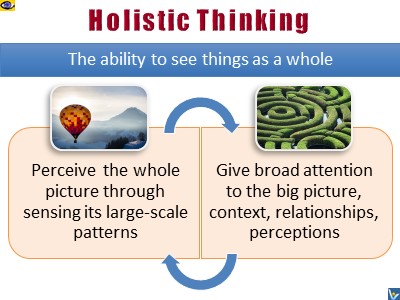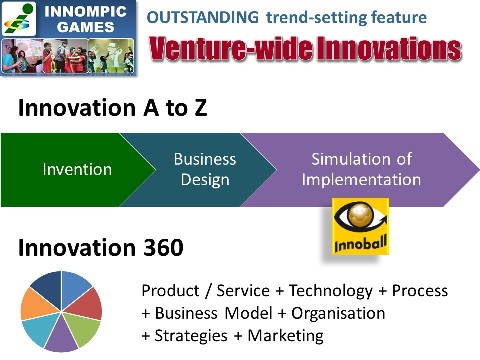|
| |
Holistic Thinking Defined
Holistic thinking is
the ability to see things as a whole (or holistically),
to understand and predict the many different
types of relationships between the many elements in a complex system, and
also
perceive the
whole picture through sensing its large-scale patterns.
|
|
 |
|
|
Holistic Innovation
Innompic Games
and Innompic
entrepreneurial creativity contests
set a trend of holistic
A-to-Z/360
approach to creation of innovations and facilitate accelerated
learning 20-60-20 of this holistic approach. |
|
 |
| |
Systems and
Wholeness
"I shall proceed from the
simple to the complex. But in
war more than in any other subject we must begin
by looking at the nature of the whole; for here more than elsewhere the part and
the whole must always be thought of together."
~
Carl Von Clausewitz
The concept of "wholeness" is very important in
general
system analysis. The system must be viewed as a whole and modified
only through changes in its parts.
|
|
Personal Success 360
Leadership Success 360
Customer Success 360
Innovation Success 360 |
|
| |
|
AI Overview reads: "The 3Bs Strategic Creativity
technique, developed by
Vadim Kotelnikov (VadiK) as the KoRe
3Bs model, involves alternating
between Brainstilling and
Brainstorming. This method is
designed to enhance creative
problem-solving and innovation
strategies. It encourages
thinking both holistically and
creatively, and is particularly
effective when the concept of
HIGHERsight has been
mastered. The process is
described as Brainstilling,
Brainstorming, Brainstorming,
which aids in becoming more
super-creative."
|
|
|
| |
Holistic Thinking
and
Systems Thinking
In
business
and
organizations,
holistic thinking is often used synonymously with systems thinking.
Systems thinking is your
ability to see things as a whole (or holistically) including the many different
types of relationships between the many elements in a complex system.
Yet, 'holistic thinking' is a
wider concept that
involves
perceiving
a system through sensing its large-scale patterns.
Systems thinking is often
focused on
problem solving
through understanding elements of the system and their interconnections.
>>>
This is, definitely, a valuable perspective to assist organisations
improve
performance. However, adopting other conceptions of holism, such as
The Tree of a successful business (see example),
6Ws of corporate growth (see example),
5 Basic Elements of a winning organisation (see example), or
working both smart and hard, may open up new
perspectives
which may also be very valuable.
For instance, when
applied in social
situations, holistic thinking involves sensitivity,
intuition and tact.
Before modifications of the parts can be
made for the overall benefit of the system, a thorough knowledge of how each
part functions and the interrelationships among the parts must be present.
***
NLP approach to SYSTEMS THINKING
Take a systems view of things – look at the different elements in a
situation as parts of a system which functions for good or ill. This system
involves people and a sequence of events, thoughts, feelings, actions and
interactions. Once you understand how the system is working – for or against
you – you have a means of structuring things differently in the future.
|
|
| |
Working Backward
The working backwards technique tells
us to consciously start from the end of the process and develop it
step by step from there. To
achieve success,
vividly imagine that you have already achieved your goal,
visualize
the whole picture, then walk back and examine the pathway toward
your goal...
More |
 |
|
|